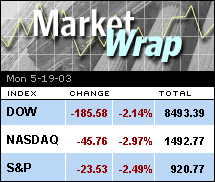NEW YORK (CNN/Money) -
Stocks tumbled Monday as the dollar slid further against the euro after weekend comments by Treasury Secretary John Snow led many investors to conclude the United States was content to let the currency fall.
A Supreme Court ruling that could hurt major drugmakers hit that sector and weighed on the broader market, as did investors' desire to take some money off the table after the stock market's recent rally.

The Dow Jones industrial average (down 185.58 to 8493.39, Charts) sank 2.1 percent, the Nasdaq composite (down 45.76 to 1492.77, Charts) tumbled 3 percent and the Standard & Poor's 500 (down 23.53 to 920.77, Charts) index lost 2.5 percent. The S&P 500 and the Nasdaq have risen for the last five weeks, and the Dow has closed higher for four out of the last five weeks.
"We've had a huge run-up, and people want to take some profits right now," said Bill Roe, portfolio manager at Melhado Flynn & Associates. "More than the currency worries or specific stocks with bad news, you've got good old-fashioned profit taking with people feeling that the market is overbought."
The sell-off got rolling early after Treasury Secretary John Snow's comments at a Group of Seven (G7) meeting implied a lack of concern about the falling dollar, and after weakness in the drug sector. But analysts argued that stocks would have been down Monday anyway, in a typical bout of consolidation following the recent rally.
Hopes for an economic and corporate recovery later this year have buoyed stocks over the last two months, despite little evidence that a pickup is in the offing. Because of this optimism, investors have largely been able to overlook the dollar, which has fallen for weeks.

Speaking in France this weekend, Snow called the recent currency decline "fairly modest" and said the greenback's value should be determined by market fundamentals and public confidence. The statement was interpreted to mean that the Bush administration is indifferent to the weakening dollar.
The dollar stabilized somewhat after the initial shock wore off but the stock market was unable to recover its losses, despite statements from the Bush administration that a strong dollar policy remains in place.
A weak dollar tends to make U.S. exports more competitive in other countries, and some economists say Bush's economic team is content to allow the dollar to drop in a bid to help the sluggish economy.
"Snow's comments about the dollar are giving investors a good excuse to take some money off the table after the recent run up," said Peter Cardillo, director of research at Global Partners Securities. "But basically, this is just a lot of profit-taking."
Tuesday brings earnings news from Home Depot and Hewlett-Packard.
Home Depot (HD: down $1.12 to $28.07, Research, Estimates), the No. 1 home improvement retailer, is forecast to have earned 37 cents per share, up from 36 cents a year earlier. Shares lost 3.8 percent Monday on weakness in the sector.
After the close of trade Tuesday, Hewlett-Packard (HPQ: down $1.07 to $16.88, Research, Estimates) is forecast to have earned 27 cents per share, up from 19 cents a year earlier. For more details on the firm's earnings report, click here. Shares lost just under 6 percent amid selling ahead of its results.
Other companies due to report results include retailers Staples (SPLS: down $0.24 to $19.74, Research, Estimates) and Gymboree (GYMB: down $0.05 to $16.44, Research, Estimates).
Tuesday's only economic report is the Treasury Budget, due out around 2 p.m. ET and not usually a market mover.
Drug ruling weighs
Drug stocks were among the market's most pronounced losers. The sector slumped after a mid-morning Supreme Court ruling gave the OK to a program in Maine to lower prices on prescription drugs. The Dow's biggest loser was Merck (MRK: down $2.80 to $56.65, Research, Estimates). Other pharmaceutical stocks that suffered included Bristol-Myers Squibb (BMY: down $1.37 to $24.45, Research, Estimates), Johnson & Johnson (JNJ: down $1.41 to $54.63, Research, Estimates), and Pfizer (PFE: down $1.81 to $31.80, Research, Estimates).
Biotechs, however, were stronger, despite losing a bit of steam following the Supreme Court ruling.

Shares of Genentech (DNA: up $16.95 to $54.85, Research, Estimates) rallied 45.1 percent in active trade after the company said that its Avastin drug, in combination with chemotherapy, was more effective in treating colon cancer than previously thought. Protein Design Labs (PDLI: up $2.15 to $13.80, Research, Estimates) rallied 18.4 percent after the firm said that a trial of the company's experimental treatment for a severe form of bowel disease proved effective.
Shares of Lowe's (LOW: down $4.00 to $40.30, Research, Estimates), the No. 2 home improvement retailer, fell 9 percent after the company issued a 2004 outlook in a range that was wider than expectations. The firm also reported fiscal first-quarter earnings that beat estimates and grew from a year earlier, on revenue that fell short of estimates.
Of the 30 issues that comprise the Dow industrials, 28 closed lower.
On the Nasdaq, semiconductors, computer hardware and software led the declines. The Philadelphia Semiconductor index (down 17.61 to 336.76, Charts), or the Soxx, lost nearly 5 percent.
Investors shrugged off the Conference Board's index of leading economic indicators, which rose 0.1 percent in April, in line with forecasts, after a decline of 0.2 percent in March.
Market breadth was negative with decliners topping advancers by around 11 to 5 on both the New York Stock Exchange and the Nasdaq. On the NYSE, volume was 1.34 billion shares, while on the Nasdaq, volume was 1.66 billion shares.
Treasury prices fell. The 10-year note lost 12/32 of a point in price, pushing the yield up to 3.46 percent. The dollar ended lower against the euro but higher against the Japanese yen.
Light crude oil futures fell 50 cents to $28.25 a barrel in New York. Gold surged $9.50 to $364.40 in New York, in response to the dollar weakness.

|

